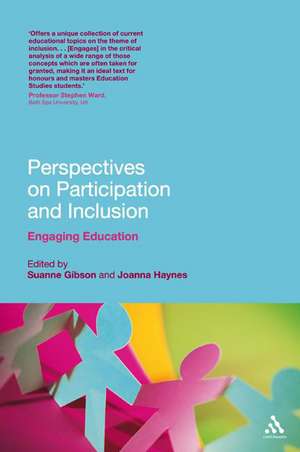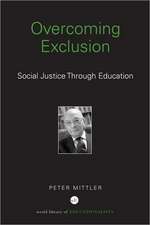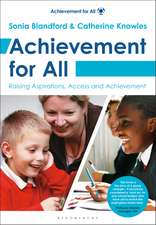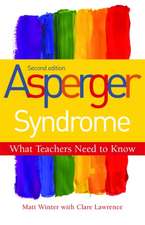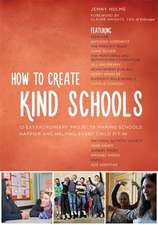Perspectives on Participation and Inclusion: Engaging Education
Editat de Dr Suanne Gibson, Dr Joanna Haynesen Limba Engleză Paperback – 22 mar 2009
Perspectives
on
Participation
and
Inclusiondraws
on
the
research
and
scholarship
of
academics
working
in
the
field
of
Education
Studies.
The
writers
are
concerned
with
enduring
yet
contemporary
themes:
making
education
engaging
and
vital
for
both
learners
and
educators,
and
achieving
wider
participation
and
more
effective
and
meaningful
inclusion
for
all.
- The book draws on philosophical ideas and educational theories, practical examples and case studies in a wide variety of educational settings and styles.
- Through the medium of brief 'edu-autobiography', each chapter is situated in the context of the author's life as an educator, appealing to readers to consider ways in which the ideas and examples discussed could be pertinent to their own life or work in education.
- Includes sections on voice and empowerment, critical and alternative perspectives on inclusion in education, and practical approaches to widening participation.
- Authors discuss ideas such as 'otherness' and 'voice', freedom, belonging and well-being in education and the relational nature of learning.
Perspectives on Participation and Inclusionis a key text for Education Studies students. In addressing fundamental questions in education, the audience will encompass school practitioners, student teachers and lecturers in further and higher education. This book will also be of interest to students and professionals in fields such as childhood studies and youth and community studies.
- The book draws on philosophical ideas and educational theories, practical examples and case studies in a wide variety of educational settings and styles.
- Through the medium of brief 'edu-autobiography', each chapter is situated in the context of the author's life as an educator, appealing to readers to consider ways in which the ideas and examples discussed could be pertinent to their own life or work in education.
- Includes sections on voice and empowerment, critical and alternative perspectives on inclusion in education, and practical approaches to widening participation.
- Authors discuss ideas such as 'otherness' and 'voice', freedom, belonging and well-being in education and the relational nature of learning.
Perspectives on Participation and Inclusionis a key text for Education Studies students. In addressing fundamental questions in education, the audience will encompass school practitioners, student teachers and lecturers in further and higher education. This book will also be of interest to students and professionals in fields such as childhood studies and youth and community studies.
| Toate formatele și edițiile | Preț | Express |
|---|---|---|
| Paperback (1) | 303.24 lei 6-8 săpt. | |
| Bloomsbury Publishing – 22 mar 2009 | 303.24 lei 6-8 săpt. | |
| Hardback (1) | 1064.18 lei 6-8 săpt. | |
| Bloomsbury Publishing – 22 mar 2009 | 1064.18 lei 6-8 săpt. |
Preț: 303.24 lei
Nou
Puncte Express: 455
Preț estimativ în valută:
58.02€ • 60.75$ • 48.13£
58.02€ • 60.75$ • 48.13£
Carte tipărită la comandă
Livrare economică 09-23 aprilie
Preluare comenzi: 021 569.72.76
Specificații
ISBN-13: 9781847060204
ISBN-10: 184706020X
Pagini: 184
Dimensiuni: 156 x 234 x 5 mm
Greutate: 0.28 kg
Editura: Bloomsbury Publishing
Colecția Continuum
Locul publicării:London, United Kingdom
ISBN-10: 184706020X
Pagini: 184
Dimensiuni: 156 x 234 x 5 mm
Greutate: 0.28 kg
Editura: Bloomsbury Publishing
Colecția Continuum
Locul publicării:London, United Kingdom
Caracteristici
The
author's
unique
approach
aims
to
extract
from
the
research
and
practical
experience
of
people
on
the
ground
to
offer
solutions
and
best
practice
for
ensuring
that
education
can
be
effective,
accessible
and
meaningful
for
all.
Cuprins
Acknowledgements
Introduction
Part One: The Voice of the Learner
Introduction
Part One: The Voice of the Learner
Chapter
1:
Inclusion
versus
neo-liberalism:
Empowering
the
'Other'
Suanne
Gibson
Inclusion:
what,
when,
why,
and
Neo-liberalism:
the
barrier
Starting from the learner's perspective
Dialogue and safe spaces versus 'school effectiveness'?
Author's note
Chapter 2: Listening to the voice of the child in education
Joanna Haynes
Starting from the learner's perspective
Dialogue and safe spaces versus 'school effectiveness'?
Author's note
Chapter 2: Listening to the voice of the child in education
Joanna Haynes
Constructs
of
child
as
learner
So what is a child?
Children's rights
Initiatives to promote children's participation in education
Conclusion
Author's note
Part Two: Critical and Alternative Perspectives on Participation and Inclusion
So what is a child?
Children's rights
Initiatives to promote children's participation in education
Conclusion
Author's note
Part Two: Critical and Alternative Perspectives on Participation and Inclusion
Chapter
3:
Education
and
after-education:
Exploring
learning
as
a
relational
process
Tony Brown
Tony Brown
Emotions
and
learning
Secure attachment
Conceptions of student
The relational psychoanalytic lens
Emotion, cognition and student identity
Imagination, disturbance and education
Identificatory confusion
Alternative ways of reading classroom spaces
Conclusion
Author's note
Chapter 4: Including Deaf Culture: Deaf young people and participation
Hannah Smith
Secure attachment
Conceptions of student
The relational psychoanalytic lens
Emotion, cognition and student identity
Imagination, disturbance and education
Identificatory confusion
Alternative ways of reading classroom spaces
Conclusion
Author's note
Chapter 4: Including Deaf Culture: Deaf young people and participation
Hannah Smith
Experiences
of
Exclusion
Inclusion in Whose Culture?
Specialist Provision or Inclusion?
Conclusion: Learning with and from Deaf Culture
Author's Note
Chapter 5: Freedom, Inclusion and Education
Joanna Haynes
Inclusion in Whose Culture?
Specialist Provision or Inclusion?
Conclusion: Learning with and from Deaf Culture
Author's Note
Chapter 5: Freedom, Inclusion and Education
Joanna Haynes
Interpretations
of
freedom
Education and political liberation
Experimental and alternative education
Mainstream education: freedom through philosophical dialogue
Freedom to think
Conclusion
Author's note
Chapter 6: Wellbeing and Education
Alan Hutchison
Education and political liberation
Experimental and alternative education
Mainstream education: freedom through philosophical dialogue
Freedom to think
Conclusion
Author's note
Chapter 6: Wellbeing and Education
Alan Hutchison
The
idea
of
Wellbeing
What is Wellbeing Education?
Why Wellbeing Education Now?
Problematising Wellbeing Education
Critical voices
Contemporary developments in Wellbeing
Conclusion
Author's note
Chapter 7: Where should pupils who experience Social, Emotional and Behavioural Difficulties (SEBD) be educated?
Helen Knowler
What is Wellbeing Education?
Why Wellbeing Education Now?
Problematising Wellbeing Education
Critical voices
Contemporary developments in Wellbeing
Conclusion
Author's note
Chapter 7: Where should pupils who experience Social, Emotional and Behavioural Difficulties (SEBD) be educated?
Helen Knowler
Where
do
I
belong?
Words Matter
The historic 'burden' of SEBD
Including pupils who experience SEBD
Mainstream school or special school: does it really matter where pupils are taught?
Belonging and school
Conclusion
Author's note
Part Three: Approaches to Participation
Words Matter
The historic 'burden' of SEBD
Including pupils who experience SEBD
Mainstream school or special school: does it really matter where pupils are taught?
Belonging and school
Conclusion
Author's note
Part Three: Approaches to Participation
Chapter
8:
Informal
learning
outdoors
Tony Rea
Tony Rea
The
nature
of
informal
learning
Participation in informal learning outdoors: benefits and learner outcomes
Current debates about challenge and risk in the outdoors and how this might affect participation
A pedagogy for outdoor learning?
Author's Note
Chapter 9: E's of access: e-Learning and widening participation in Education
Steve Wheeler
Participation in informal learning outdoors: benefits and learner outcomes
Current debates about challenge and risk in the outdoors and how this might affect participation
A pedagogy for outdoor learning?
Author's Note
Chapter 9: E's of access: e-Learning and widening participation in Education
Steve Wheeler
The
Information
Age
and
the
knowledge
society
Digital Divides
The 'e' is for Everything
The Nature of e-Learning
Where does the learner fit into the 'E'quation?
E is for Extended Learning
E is for Enhanced Learning
E is for Everywhere Learning
E is for Exclusion
Conclusion
Author's Note
Chapter 10: Widening Participation in Adult Education
Roger Cutting
Digital Divides
The 'e' is for Everything
The Nature of e-Learning
Where does the learner fit into the 'E'quation?
E is for Extended Learning
E is for Enhanced Learning
E is for Everywhere Learning
E is for Exclusion
Conclusion
Author's Note
Chapter 10: Widening Participation in Adult Education
Roger Cutting
The
Parents
as
Educators
Programme
Getting Going
The Course Design
Recruitment
Unlocking the door
The 'R' word - Retention issues
Maintaining retention
The End
Evaluating a programme
Conclusions
Author's note
Getting Going
The Course Design
Recruitment
Unlocking the door
The 'R' word - Retention issues
Maintaining retention
The End
Evaluating a programme
Conclusions
Author's note
Recenzii
'Offers
a
unique
collection
of
current
educational
topics
on
the
theme
of
inclusion...[Engages]
in
the
critical
analysis
of
a
wide
range
of
those
concepts
which
are
often
taken
for
granted,
making
it
an
ideal
text
for
honours
and
masters
Education
Studies
students.' Stephen
Ward,
Professor
of
Education
and
Dean
of
the
School
of
Education,
Bath
Spa
University,
UK
'This book would be useful and of interest to students on Education Studies programme, both undergraduate and postgraduate, and also students and professionals working in childhood studies, or in youth and community studies. It is a collection of accounts by different authors, all involved in some way in developments in the field of Education Studies. However, this book does more than merely give an account of particular policies or how they impact upon the field of education as a whole. It engages the reader with the theory and offers them a critical angle from which they can explore this extensive field (education) as a theory and practice. Overall, this is an interesting collection of papers that would equip education studies students with a rounded basic knowledge of different issues and perspectives on participation and inclusion.' The Higher Education Academy, November 2009
'This book would be useful and of interest to students on Education Studies programme, both undergraduate and postgraduate, and also students and professionals working in childhood studies, or in youth and community studies. It is a collection of accounts by different authors, all involved in some way in developments in the field of Education Studies. However, this book does more than merely give an account of particular policies or how they impact upon the field of education as a whole. It engages the reader with the theory and offers them a critical angle from which they can explore this extensive field (education) as a theory and practice. Overall, this is an interesting collection of papers that would equip education studies students with a rounded basic knowledge of different issues and perspectives on participation and inclusion.' The Higher Education Academy, November 2009
